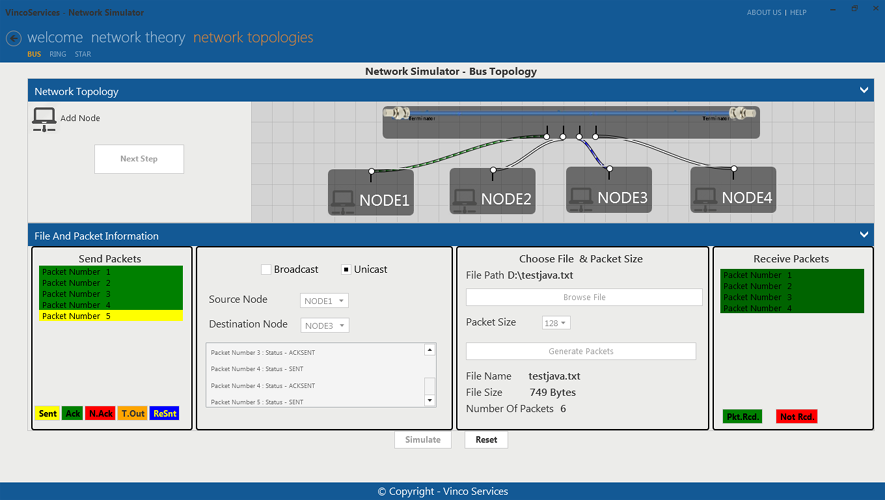Network Simulator & Learning Resource Software (VPL-NSLS)
Network Simulator & Learning Resource Software (VPL-NSLS)
SALIENT FEATURES:
- All major topics in Networking are covered thoroughly.
- Each topic is explained in details.
- Even complex topics have been made easy to understand.
- Videos and Animation included which makes understanding of theory topics better and easy.
- Entire theory part can be read using text to speech facility.
- Various Networking Components can be simulated easily.
- Facility to create user defined Networks.
- Simulation of functioning of created Networks.
- Measurement of Various Network parameters.
- Various Experiments can be performed with different combinations.
- Drag and drop facility to add Nodes to Network.
- Any numbers of Nodes can be added.
SPECIFICATIONS:
Theory topics: Computer Networks
- Type of Computer Networks
- LAN
- WAN
- WLAN
- Open System Interconnection (OSI) Reference Model
- Physical Layer
- Data Link Layer
- Network Layer
- Transport Layer
- Session Layer
- Presentation Layer
- Application Layer
- Data Transmission
- Data Transmission Type
- Parallel Data Transmission
- Serial Data Transmission
- Data Transmission Modes
- Simplex
- Half-Duplex
- Full-Duplex
- Data Transmission Type
- Data Framing, Overhead etc.
- Working of Protocol
- Media Access Control (MAC) Addressing
- MAC Protocol
- Switching
- STP – Spanning Tree Protocol
- Parts of Switching:
- Transport Network
- Transport Control
- Network Control
- Component s of Switching
- Switching Architectures
- Switching Techniques
- Circuit Switching
- Packet Switching
- Message Switching
- Transmission Methods in Switches
- Unicast
- Broadcast
- Multicast
- Port Addressing in Transport Layer
- Type of Services
- Connection Oriented Service – TCP
- Connectionless Service – UDP
- Transmission Control Protocol (TCP)
- Transmission Timers
- Retransmission Timer
- Quite Timer
- Persistence Timer
- Keep Alive Timer
- Idle Timer
- Windowing Concept
- Sliding Window
- Silly Window Syndrome
- Data Fragmentation/Segmentation
- User Datagram Protocol (UDP)
- Routing Information Protocol (RIP)
- Distance – Vector Routing
- Link State Routing
Theory topics: Network Topologies
- Bus Topology
- Ring Topology
- Star Topology
- Mesh Topology
- Tree Topology
- Hybrid Topology
Theory topics: Network Protocols
- Stop N Wait
- Go Back To N
- Selective Repeat
- PAR
EXPERIMENTS:
- Study of Data Transmission Type
- Study of Fundamentals of Networking
- Creation of Network with different Topologies
- Study of working of different networking protocols
- Simulation of Bus topology Network with Unicast
- Simulation of Bus Topology Network with Broadcast
- Simulation of Ring Topology Network
- Simulation of Ring Topology with Token ring protocol
- Experiments of Ring Topology with options to select packet delay, token delay, Source Node, Destination node and first Node etc.
- Experiments with options to select different packet size
- Simulation experiments with or without error/error probability
- Simulation of Star Topology Network
- Experiments simulation with option to select window size
- Study of error detection and correction
- Study of switch architecture and transmission in switch
- Study of various protocols Vs normalized throughput / response time
- Study of error probability Vs throughput / data loss
- Study of number of nodes Vs mean delay
- Study of data size Vs normalized throughput.
- Study of number of Nodes Vs throughput, normalized throughput
- Study of congestion control algorithm Vs throughput
- Study of congestion control algorithm Vs reliability
- Study of used link Vs normalized throughput
- Study of address resolution protocol
- Study of classless inter domain routing
- Study of sub netting
- Simulate Ring Topology
- Simulate Ring Topology with various protocols viz Stop N Wait, Go back to N, Selective repeat.

